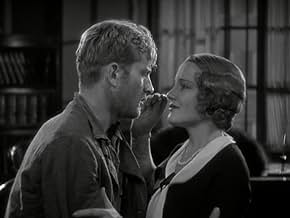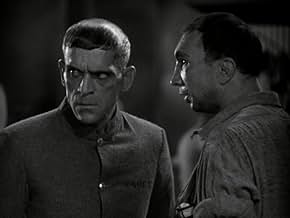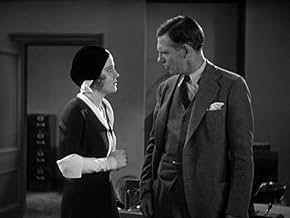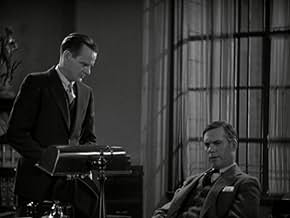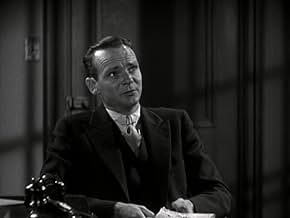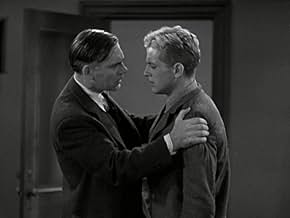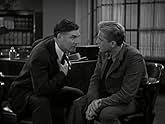AVALIAÇÃO DA IMDb
6,9/10
1,5 mil
SUA AVALIAÇÃO
Adicionar um enredo no seu idiomaAfter a failed attempt at running for governor, D.A. Mark Brady is appointed warden of the state prison where many of the criminals he prosecuted are incarcerated.After a failed attempt at running for governor, D.A. Mark Brady is appointed warden of the state prison where many of the criminals he prosecuted are incarcerated.After a failed attempt at running for governor, D.A. Mark Brady is appointed warden of the state prison where many of the criminals he prosecuted are incarcerated.
- Direção
- Roteiristas
- Artistas
- Indicado a 1 Oscar
- 3 vitórias e 1 indicação no total
DeWitt Jennings
- Captain Gleason
- (as De Witt Jennings)
Paul Porcasi
- Tony Spelvin
- (as Paul Porcassi)
Richard Bishop
- Minor Role
- (não creditado)
Andy Devine
- Cluck - a Convict with knife
- (não creditado)
James Guilfoyle
- Detective Doran
- (não creditado)
Frank Hagney
- Prison Guard in Yard
- (não confirmado)
- (não creditado)
- Direção
- Roteiristas
- Elenco e equipe completos
- Produção, bilheteria e muito mais no IMDbPro
Avaliações em destaque
I would say it is THE best except for my fondness for "Caged." This is a brilliant movie, as shocking as Hawks's "Scarface," released a year later and far better known.
Walter Huston is a district attorney when we met him. Throughout, he is given to the one word, catchall statement or response "Yeah." Huston has rarely if ever been better -- and he was one of the greats of Hollywood history.
Phillips Holmes is excellent as a young man he sends to prison. He is innocent in all senses before he gets there. But he quickly leans the code of the title.
Constance Cummins isn't given much as Huston's daughter but she is appealing. However, Boris Karloff gives one of his very finest performances as a tough but decent prisoner. Of course, of course he is fine in "Frankenstein." And he is wildly brilliant in "Lured" many years later. Here he gives a solid, unadorned, moving performance.
Clark Marshall, a name I do not recognize, is also fine. He plays a sniveling, conniving inmate. And DeWitt Jennings is shocking as a brutal guard.
Amazingly, I had never seen this movie before tonight. It's bone I will want to see again; and I urge you to see it, too.
Walter Huston is a district attorney when we met him. Throughout, he is given to the one word, catchall statement or response "Yeah." Huston has rarely if ever been better -- and he was one of the greats of Hollywood history.
Phillips Holmes is excellent as a young man he sends to prison. He is innocent in all senses before he gets there. But he quickly leans the code of the title.
Constance Cummins isn't given much as Huston's daughter but she is appealing. However, Boris Karloff gives one of his very finest performances as a tough but decent prisoner. Of course, of course he is fine in "Frankenstein." And he is wildly brilliant in "Lured" many years later. Here he gives a solid, unadorned, moving performance.
Clark Marshall, a name I do not recognize, is also fine. He plays a sniveling, conniving inmate. And DeWitt Jennings is shocking as a brutal guard.
Amazingly, I had never seen this movie before tonight. It's bone I will want to see again; and I urge you to see it, too.
"The Criminal Code" is centered around the theme "An Eye for An Eye." This theme is the reason that young Robert Graham is sent to prison, the reason why the prisoners object to the D.A. becoming the Warden of the prison, and the reason why Graham is sent to "the hole" near the end of the film. For 1931, it was one of the first critical looks at this theme. It raises certain questions as to the morals of the law, and the Criminal Code versus the Prisoners Code. Phillips Holmes gives a good enough performance as Robert Graham, and Boris Karloff came off well as the inmate with a bone to pick (months before becoming Frankenstein), but the performance that I liked the most was Walter Huston, who played the D.A.-turned-prison-warden. Huston's character was a wily one, who said "Yeah" and "Yeah?" about a hundred times throughout the film.
The lessons unlearned belong to Walter Huston's character, Mark Brady, but I'll get to that later.
Philip Holmes plays Robert Graham, a young man of twenty who gets into an altercation in a dance hall and ends up killing the other guy, someone he's never even met before. D.A. Mark Brady is not a man without compassion. He even states how, were he the defense attorney, he would get the boy off without serving a day. As a result, he sends him up for manslaughter rather than murder. However, that is still ten years, and six years into the sentence Graham is a man who is losing hope and his sanity.
In an odd twist of fate D.A. Mark Brady becomes warden of the prison, a place inhabited by many of the men he helped convict. The prison doctor comes to Brady with a request - let Graham be Brady's private driver for awhile, to get him out of the prison factory. Brady agrees. A few short months later and Graham is beginning to have a new lease in life. Plus, there is a complication - he is falling in love with Brady's daughter. However, an event soon occurs at the prison that threatens Graham's hope for a better future.
As for the lessons unlearned, the one quirky thing about this film is how D.A. turned prison warden Brady keeps saying "you've go to take things how they break", never realizing that in many cases - exhibit A being the case of inmate Robert Graham - Brady is in total control of how things break, in particular the fact that Robert Graham, a basically square kid, is an inmate in the first place. However, at least Brady is not a hypocrite, since he seems to be willing to take the good with the bad in his own life as well. A pretty complex character for an early 30's film.
Of course all classic movie fans are familiar with Walter Huston and his many abilities and roles. However, most people will not have heard of Philip Holmes. Partly this is because his early successes in film did not lead to better things as the 1930's progressed, and the rest of the reason is that many of his early successes occurred at Paramount, whose early films have been largely unseen for decades. This is worth checking out. The screenplay was nominated for an Oscar, and the performances are quite good.
Philip Holmes plays Robert Graham, a young man of twenty who gets into an altercation in a dance hall and ends up killing the other guy, someone he's never even met before. D.A. Mark Brady is not a man without compassion. He even states how, were he the defense attorney, he would get the boy off without serving a day. As a result, he sends him up for manslaughter rather than murder. However, that is still ten years, and six years into the sentence Graham is a man who is losing hope and his sanity.
In an odd twist of fate D.A. Mark Brady becomes warden of the prison, a place inhabited by many of the men he helped convict. The prison doctor comes to Brady with a request - let Graham be Brady's private driver for awhile, to get him out of the prison factory. Brady agrees. A few short months later and Graham is beginning to have a new lease in life. Plus, there is a complication - he is falling in love with Brady's daughter. However, an event soon occurs at the prison that threatens Graham's hope for a better future.
As for the lessons unlearned, the one quirky thing about this film is how D.A. turned prison warden Brady keeps saying "you've go to take things how they break", never realizing that in many cases - exhibit A being the case of inmate Robert Graham - Brady is in total control of how things break, in particular the fact that Robert Graham, a basically square kid, is an inmate in the first place. However, at least Brady is not a hypocrite, since he seems to be willing to take the good with the bad in his own life as well. A pretty complex character for an early 30's film.
Of course all classic movie fans are familiar with Walter Huston and his many abilities and roles. However, most people will not have heard of Philip Holmes. Partly this is because his early successes in film did not lead to better things as the 1930's progressed, and the rest of the reason is that many of his early successes occurred at Paramount, whose early films have been largely unseen for decades. This is worth checking out. The screenplay was nominated for an Oscar, and the performances are quite good.
Sometimes you seem to get into a position where you have to take your medicine for an even unintended actions. That is what happens to poor 20-year-old Bob Graham, and within 10 minutes into the movie, he's in the infinite world of prison, where he must learn yet another set of codes of the criminal sort. Creepy Ned Galloway (Boris Karloff just before his "Frankenstein" turn) takes a rather minor (at least early on) role and fills it with gusto (maybe its that creepy little haircut) in a claustrophobic cell. Later, he does the right thing for rehabilitated and soon-to-be-paroled (maybe) Graham, who does not violate the titular Criminal Code (since he's still a con).
James Whale wanted Karloff for his monster after seeing Boris in this flick, and after you see it, you'll know why.
BTW, who doesn't love a good prison movie yarn, and with Karloff in it, it rates a "9."
James Whale wanted Karloff for his monster after seeing Boris in this flick, and after you see it, you'll know why.
BTW, who doesn't love a good prison movie yarn, and with Karloff in it, it rates a "9."
Twenty year-old Robert Graham (Phillips Holmes) accidentally kills another man in a drunken brawl. District Attorney Mark Brady (Walter Huston) has to prosecute the young man, despite feeling sympathetic towards him. Graham is convicted to ten years in the state penitentiary. Six years later, D.A. Brady has been appointed warden of the prison and is appalled at what prison life has done to Graham. With help from his daughter (Constance Cummings), who falls in love with Graham, Brady gets the young man back on the right track. But all of it may come to naught when another prisoner is murdered and Graham is forced to choose between snitching and keeping quiet.
Phillips Holmes is not a name that most people, including myself, are familiar with. He retired from acting in 1938 and died in a mid-air collision in Canada four years later. This is probably his most well-known role and that's not saying much since this is hardly a well-known film. But he does a terrific job. Expectedly good performance from Walter Huston, arguably Hollywood's best actor in the early talkies. Also features Boris Karloff in one of his best pre-Frankenstein roles as a vengeful inmate who hates squealers.
Great early Howard Hawks crime drama. Nice Hawksian banter and overlapping dialogue, particularly in the early scenes with reporters. Remade twice, as Penitentiary in 1938 and Convicted in 1950. A must-see for fans of Hawks, Huston, and Karloff.
Phillips Holmes is not a name that most people, including myself, are familiar with. He retired from acting in 1938 and died in a mid-air collision in Canada four years later. This is probably his most well-known role and that's not saying much since this is hardly a well-known film. But he does a terrific job. Expectedly good performance from Walter Huston, arguably Hollywood's best actor in the early talkies. Also features Boris Karloff in one of his best pre-Frankenstein roles as a vengeful inmate who hates squealers.
Great early Howard Hawks crime drama. Nice Hawksian banter and overlapping dialogue, particularly in the early scenes with reporters. Remade twice, as Penitentiary in 1938 and Convicted in 1950. A must-see for fans of Hawks, Huston, and Karloff.
Você sabia?
- CuriosidadesThe prison yard sequence was shot at M-G-M, using the set originally built for "The Big House" (1930).
- Erros de gravaçãoPaul Porcasi's name is spelled "Porcassi" in the opening credits.
- Citações
Mark Brady: [to Graham] Tough luck, Bob, but that's the way they break sometimes. You got to take them the way they fall.
- Cenas durante ou pós-créditosThe film's credits do not say that Howard Hawks directed the film; instead, they say that the film is "A Howard Hawks Production."
- ConexõesAlternate-language version of El código penal (1931)
Principais escolhas
Faça login para avaliar e ver a lista de recomendações personalizadas
- How long is The Criminal Code?Fornecido pela Alexa
Detalhes
- Data de lançamento
- País de origem
- Idioma
- Também conhecido como
- The Criminal Code
- Locações de filme
- Empresa de produção
- Consulte mais créditos da empresa na IMDbPro
- Tempo de duração1 hora 37 minutos
- Cor
Contribua para esta página
Sugerir uma alteração ou adicionar conteúdo ausente

Principal brecha
By what name was O Código Penal (1931) officially released in Canada in English?
Responda
